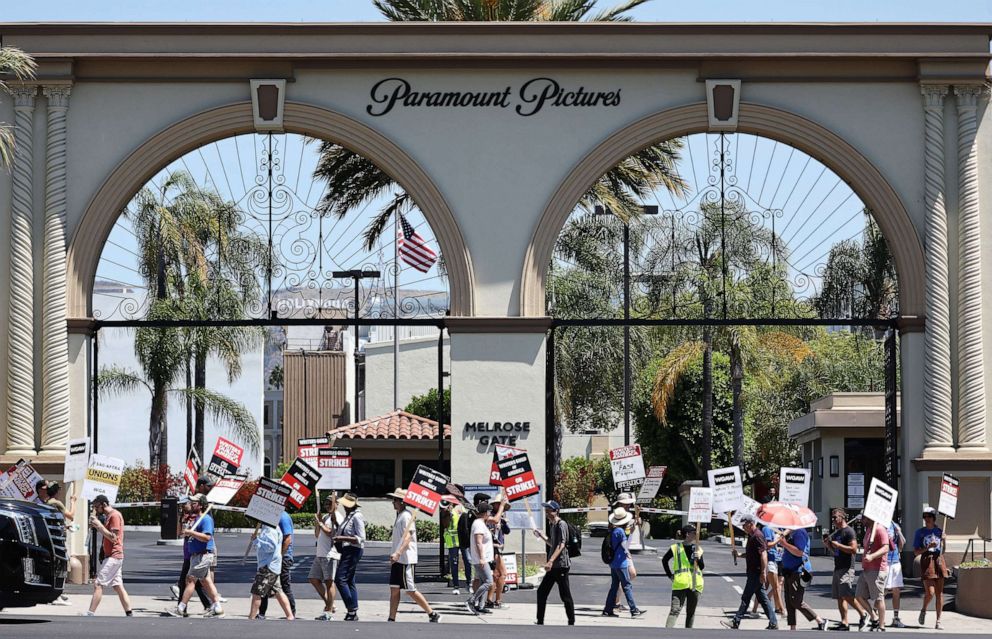Union and Studios Engage in Talks with Federal Mediators, Raising Concerns of an Impending SAG-AFTRA Strike
The entertainment industry is currently on edge as the Screen Actors Guild-American Federation of Television and Radio Artists (SAG-AFTRA) union and major studios engage in talks with federal mediators. This development has raised concerns about a potential strike that could have far-reaching consequences for the industry.
The negotiations between SAG-AFTRA and the Alliance of Motion Picture and Television Producers (AMPTP) have been ongoing for several months. However, the involvement of federal mediators indicates that the discussions have reached a critical point, with both parties struggling to find common ground on key issues.
One of the main concerns for SAG-AFTRA is the issue of compensation and residuals for streaming platforms. With the rise of streaming services like Netflix, Amazon Prime, and Disney+, actors are demanding fair compensation for their work in these digital platforms. The union argues that actors should receive residuals similar to those they receive for traditional television and film productions.
Another point of contention is the working conditions for actors, particularly in terms of safety protocols amidst the ongoing COVID-19 pandemic. SAG-AFTRA has been advocating for stricter safety measures on set to protect its members from potential exposure to the virus. The union believes that studios should take more responsibility in ensuring a safe working environment for their actors.
The involvement of federal mediators suggests that both parties have reached an impasse and are struggling to find a resolution on these critical issues. While strikes are not uncommon in the entertainment industry, they can have significant consequences for all parties involved.
A potential strike by SAG-AFTRA could disrupt the production schedules of major studios, leading to delays in film and television releases. This would not only impact the studios financially but also affect the livelihoods of thousands of workers in the industry, including actors, crew members, and support staff.
Furthermore, a strike could also have a ripple effect on the wider economy. The entertainment industry contributes billions of dollars to local economies through job creation, tourism, and related industries. A prolonged strike would result in a loss of revenue for businesses that rely on the industry’s activities.
The last major strike by SAG-AFTRA occurred in 2008, which lasted for 100 days and cost the industry an estimated $2.5 billion. The impact was felt across the board, from production companies to small businesses that catered to the entertainment industry.
Both SAG-AFTRA and the studios understand the potential consequences of a strike and the need to find a mutually agreeable solution. The involvement of federal mediators is a positive step towards resolving the issues at hand. These mediators bring a neutral perspective and expertise in conflict resolution, which could help bridge the gap between the union and the studios.
While the talks continue, industry professionals and fans alike anxiously await the outcome. The hope is that both parties can find common ground and reach a fair agreement that addresses the concerns of SAG-AFTRA members while also ensuring the sustainability of the entertainment industry.
In the meantime, contingency plans are likely being put in place by studios to mitigate any potential disruptions caused by a strike. These plans may include rescheduling or postponing productions, seeking alternative talent, or exploring other avenues to release content.
Ultimately, the outcome of these negotiations will have a significant impact on the future of the entertainment industry. It is crucial for both SAG-AFTRA and the studios to prioritize open dialogue, compromise, and finding solutions that benefit all parties involved. Only through constructive negotiations can they avoid an impending strike and maintain a thriving and sustainable industry for years to come.



